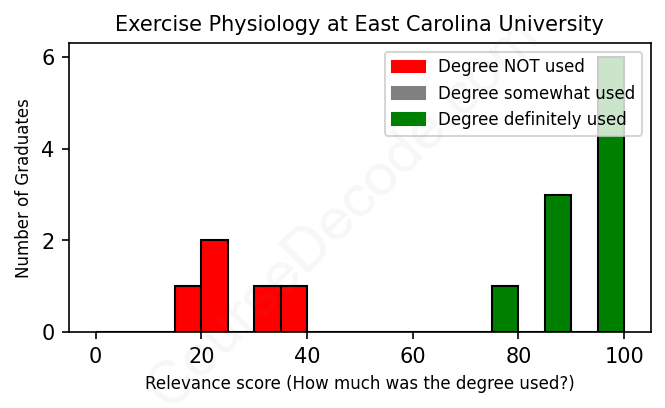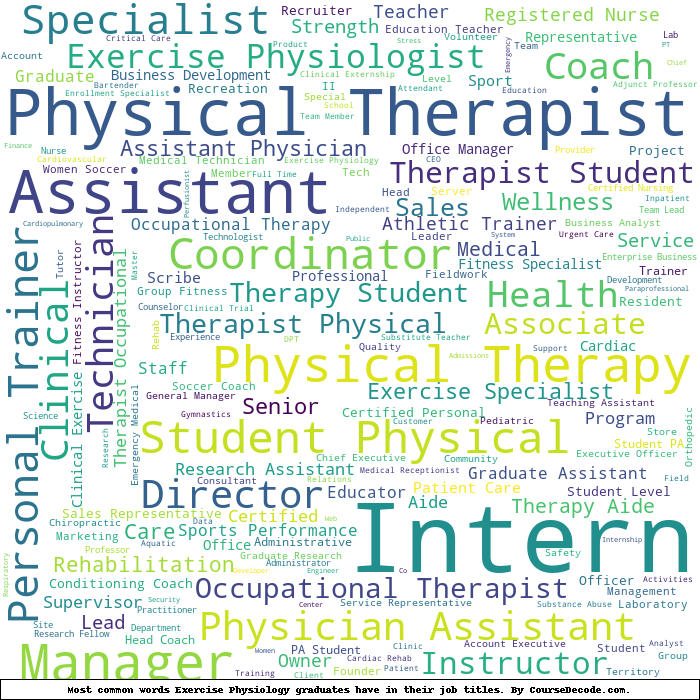
First, some facts. Of the Exercise Physiology graduates from East Carolina University we've analyzed , here's how many have used (or NOT used) their degree in their career:

These are estimates based on AI analysis of 15 LinkedIn profiles (see below).
The verdict? Slightly above average. Overall, with an average relevance score of 70%, Exercise Physiology graduates from East Carolina University have a slightly higher likelihood (+3%) of finding work in this field compared to the average graduate across all fields:
And for comparison, here's the chart for all profiles we've looked at across all degrees.
Also, after graduating, 46% of these graduates have pursued further education other than another Bachelor's degree (such as a Masters degree or other), compared to the average across all profiles of 35%. This suggests you may need more than just a Bachelors degree to be competitive as a Exercise Physiology graduate.
See the details:
|
Relevance score: 100% We think this person has gone into a career highly relevant to their degree. We think this person has gone into a career highly relevant to their degree.
DEGREE INFOGraduated in 2020 from East Carolina University with a Bachelor's degree in Exercise Physiology. Also pursued further education since (see below). JOB HISTORY SINCE GRADUATIONGraduate Research Assistant East Carolina University Graduate School Aug 2020 - May 2022 Cardiopulmonary Exercise Test Technician  Met-Test, LLC Oct 2022 - Present FURTHER DEGREES DONE SINCE GRADUATINGMaster's degreeEast Carolina University 2020 - 2022 ABOUTNo information provided. |
The top 10 most common jobs done by the graduates we've analyzed (ranked most common to least) are:
Looking at the career paths of graduates from East Carolina University who earned a degree in Exercise Physiology, a pretty clear pattern emerges. Many of these individuals have landed roles directly related to health and fitness, such as Fitness Directors, Physical Therapists, and Athletic Trainers. These positions leverage their understanding of human physiology, exercise science, and rehabilitation techniques, which are core elements of their education. For instance, roles like Fitness Director or Exercise Specialist allow these graduates to apply their knowledge quite effectively in real-world settings where they can influence people’s health and wellbeing through tailored exercise programs and rehabilitation techniques.
However, it's also evident that not all paths taken by these graduates are relevant to their degrees. Some have ventured into roles that, while perhaps still within the healthcare spectrum, don’t really touch on exercise physiology directly—like customer service positions at retail stores or even wellness roles that feel more generalized. Jobs like being an Educator at lululemon or working as a Grocery Manager tend to stray far from the core subjects of their studies. All in all, while many are indeed pursuing careers that align closely with their degree and making a significant impact in the field of exercise physiology, there's also a noticeable portion that has drifted into unrelated areas. So, it's a mix of strong relevance and some roles that don’t quite utilize their specialized training.
Here is a visual representation of the most common words in job titles for Exercise Physiology graduates (this is across all Exercise Physiology graduates we've analyzed, not just those who went to East Carolina University):

When looking at the career paths of graduates from East Carolina University with a degree in Exercise Physiology, it's clear there's a mix of trajectories. Right out of college, many seem to land jobs in health and fitness settings, such as fitness directors, exercise specialists, or as physical therapy aides. For instance, individuals who graduated around 2015 have started as interns or in entry-level roles related to fitness and health care, which is pretty relevant to what they studied. This makes sense because their degree equips them with a foundation that can easily transition into these roles.
As we look further down the line, like 5 to 10 years after graduation, it's interesting to see that a fair number have moved into more specialized positions, such as physical therapists or even physician assistants. Others have branched into roles outside direct exercise physiology, like customer service or retail, which shows that not everyone sticks to their initial field. So while many do follow a path that aligns with their Exercise Physiology degree initially, there are quite a few who seem to explore various unrelated career options later on. Overall, it's a bit of a mixed bag—some are clearly doing well in relevant fields, while others have ventured off into different territories entirely.
Getting a Bachelor’s degree in Exercise Physiology can be pretty challenging, but it’s not impossible! At East Carolina University, you'll be diving into some tough subjects like anatomy, biology, and exercise science, and you'll need to get comfortable with a fair bit of lab work and hands-on activities. It’s definitely a good mix of papers and practical experiences, which keeps things interesting, but you’ll want to stay on top of your studies. Overall, it’s considered to be a bit more rigorous than your average degree, so if you're passionate about fitness and really ready to hit the books, you’ll likely do just fine!
Most commonly, in the LinkedIn profiles we've looked at, it takes people 4 years to finish a Bachelor degree in Exercise Physiology.
Looking at the job histories of these exercise physiology graduates from East Carolina University, it seems like they’ve had a mixed bag when it comes to making money. For some, like the Fitness Director and Physician Assistant, it looks like they’ve landed roles that likely pay well, especially considering the responsibilities that come with those titles. However, others have bounced around between internships and entry-level positions, like those who worked as fitness specialists or nursing assistants, which typically don’t add up to the big bucks. Overall, while some have found solid earnings, others are still climbing the ladder and may not be raking in the cash just yet.
Here is a visual representation of the most common words seen in the "about" section of LinkedIn profiles who have a Bachelor degree in Exercise Physiology (this is across all Exercise Physiology graduates we've analyzed, not just those who went to East Carolina University). This may or may not be useful:

Here are all colleges offering a Bachelor degree in Exercise Physiology (ordered by the average relevance score of their Exercise Physiology graduates, best to worst) where we have analyzed at least 10 of their graduates:
| College | Score | Count |
|---|---|---|
 East Carolina University East Carolina University
|
70 | 15 |
 California State University-Chico California State University-Chico
|
70 | 11 |
 University of Massachusetts Lowell University of Massachusetts Lowell
|
66 | 15 |
 West Virginia University West Virginia University
|
63 | 23 |
 University of Miami University of Miami
|
59 | 11 |
 Florida State University Florida State University
|
55 | 22 |
 Ohio University Ohio University
|
55 | 13 |
 Brigham Young University - Idaho Brigham Young University - Idaho
|
40 | 21 |